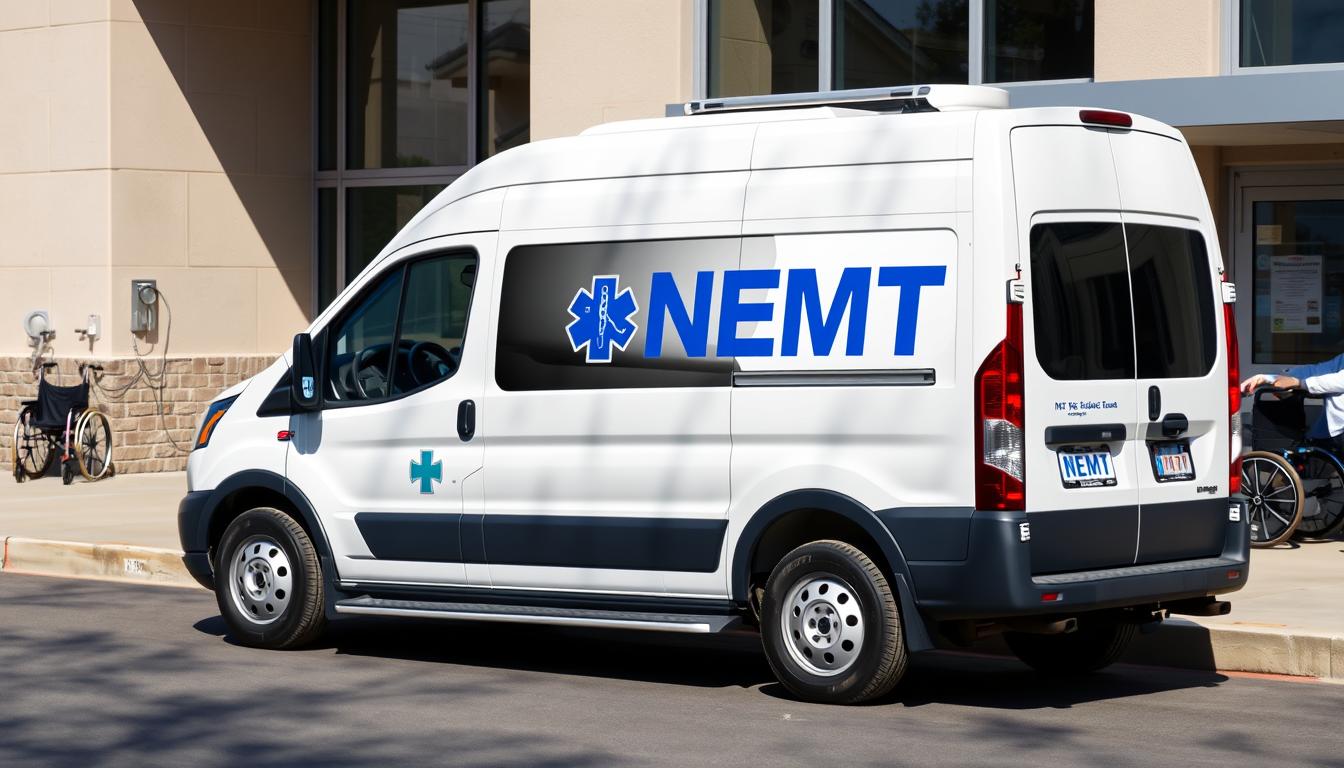Did you know that not having the right insurance could ruin your Non-Emergency Medical Transportation (NEMT) business? As a NEMT provider, knowing the insurance needs is key before you start. Having the right insurance protects your patients and keeps your business legal and successful.
Recent changes in rules show how important it is to have enough insurance for patient transport. Find out what the NEMT business insurance guide says about meeting these essential requirements before you begin.
Key Takeaways
- California mandates a minimum liability insurance of $1 million per occurrence for NEMT providers.
- Primary insurance is a must, making it the first to pay out in claims.
- Consider higher coverage levels and additional policies like auto liability, physical damage, and uninsured motorist coverage.
- Proper insurance helps avoid legal penalties and builds client trust.
- Review multiple NEMT insurance providers for the best coverage and cost options.
The Importance of NEMT Insurance
Non-Emergency Medical Transportation (NEMT) insurance is key for health sector access. It protects the elderly, sick, or disabled by covering unexpected events like accidents and injuries.
Ensuring Passenger Safety
NEMT insurance focuses on making travel safer for passengers. It offers financial help for accidents, so passengers get medical care without extra costs.
Protecting Providers
Insurance is crucial for NEMT providers. It shields them from financial risks from accidents or legal claims. It covers many things, like vehicle damage and professional mistakes, helping providers stay in business.
Maintaining Compliance with Regulations
Following healthcare transportation rules is a must, not just a suggestion. States have strict rules, often with higher insurance needs than regular cars. This ensures providers meet all legal and operational standards.
| Insurance Type | Description | Requirement |
|---|---|---|
| Commercial Auto Insurance | Covers vehicle damage and liability | Mandatory in most states |
| Professional Liability Insurance | Protection against professional service errors | Highly recommended |
| Sexual Abuse & Molestation Insurance | Covers legal costs related to abuse claims | Mandatory for transporting children |
| Assault & Battery Insurance | Protects against claims from conflicts | Recommended based on service area |
| Non-Owned Auto Coverage | Covers rented or leased vehicles | Legal requirement |
Types of NEMT Insurance Coverage
It’s important to know about the different types of Non-Emergency Medical Transportation (NEMT) insurance. Each type helps protect your business from different risks. This ensures you’re covered for all possible situations.
General Liability Insurance
NEMT general liability insurance is key for your business. It covers claims for bodily injuries, property damage, and personal injury. This insurance helps keep your clients trusting you.
Auto Liability Insurance
Auto liability coverage is a must for NEMT vehicles. It protects your business from financial losses due to accidents. This includes bodily injury and property damage.
Commercial Auto Insurance
A commercial auto policy for NEMT offers many benefits. It covers liability in accidents, physical damage to vehicles, and medical payments. It also protects against uninsured motorists. This is crucial for keeping your fleet safe.
Workers’ Compensation Insurance
NEMT workers’ comp insurance is essential. It covers medical expenses and lost wages for injured employees. It’s required in almost every state. This ensures your business meets legal standards and supports your staff.
State Regulations for NEMT Insurance
State-specific NEMT regulations set the rules for NEMT providers in different areas. To follow these rules, providers need to know the legal standards for transportation services. It’s important to keep up with these regulations to avoid legal issues.
Variation by State
The rules for NEMT services change from state to state. For example, in California, paratransit agencies need a big fleet to serve big cities. This is because over 7 million elderly people need transportation there.
In Washington State, the Health Care Authority runs the NEMT program. It covers all 39 counties through six transportation brokers.
Following state-specific NEMT regulations helps ensure NEMT insurance compliance. States like California and Washington have clear rules for providers. These rules cover everything from fleet requirements to vehicle features.
Key State-Specific Requirements
It’s crucial for providers to know the key requirements in their state. In California, providers must follow incident reporting rules and have the right fleet. They also need to meet vehicle standards.
In Washington State, NEMT must be medically necessary and covered by Medicaid. Providers need to be licensed and follow federal rules to avoid conflicts of interest.
The table below shows the main differences in NEMT regulations for California and Washington:
| State | Key Regulations |
|---|---|
| California |
|
| Washington |
|
By following these state-specific rules, NEMT providers can meet legal standards. This makes operations smoother and reduces legal problems.
Factors Influencing NEMT Insurance Costs
It’s important for NEMT providers to know what affects their insurance costs. Things like vehicle age, driver skills, and where you operate are key.
Vehicle Age and Features
The age and state of your vehicles greatly impact your insurance costs. Cars in good shape are less likely to crash, which can lower your premiums. But, older or not well-kept vehicles might cost more because they’re riskier.
Features like wheelchair access or safety systems also play a part. They can either make your vehicle safer or require more insurance.
Driver Qualifications
Drivers with clean records help keep insurance costs down. Insurers look at a driver’s experience, past tickets, and claims history. Training and background checks can also reduce risks and lower premiums.
Drivers with a history of accidents or tickets will likely pay more. But, safe driving can lead to lower costs and even discounts.
Business Location and Travel Radius
Where you operate affects your insurance costs. Urban areas with lots of traffic and accidents cost more than rural or suburban ones. The distance your vehicles travel also matters.
Long trips increase the chance of accidents, which raises insurance costs. Keeping an eye on your routes can help control these expenses.
| Region | Average Annual Cost |
|---|---|
| Rural Areas | $3,500 |
| Suburban Areas | $4,500 |
| Urban Areas | $5,500 |
| Large Cities | $7,500 |
Knowing what affects NEMT insurance costs helps providers make smart choices. By focusing on vehicle condition, driver skills, and location, companies can better manage their insurance expenses.
Choosing the Right Insurance Provider
Choosing the right NEMT insurance provider is crucial for your business. Look for a company with a good reputation, lots of experience, and strong finances. Also, make sure they offer the NEMT coverage options you need. This will help make your business safer and more efficient.
When picking a provider, check their market presence. For example, Garzor Insurance focuses on non-emergency medical transport in Florida. They offer General Liability, Workers’ Compensation, and Commercial Auto Insurance.
Working with a trusted NEMT insurance company means you get tailored options. Garzor Insurance gets quotes from many carriers. This ensures your policies fit the NEMT sector well. Here are key things to think about:
- Industry Experience: See how long the provider has been around and their focus on NEMT insurance.
- Reputation: Check what others say about the insurer to gauge their reliability and service.
- Financial Stability: Make sure the insurance company is financially sound to handle claims well.
- Coverage Options: Look at the NEMT coverage they offer to see if it meets your needs.
To help choose, compare quotes and talk to experienced brokers. This will help you find a plan that’s affordable and fits the NEMT industry well.
| Feature | Description |
|---|---|
| General Liability Insurance | Protects against claims of bodily injury and property damage. |
| Commercial Auto Insurance | Covers vehicles used for business. |
| Workers’ Compensation Insurance | Covers medical and lost wages for injured employees. |
| Umbrella/Excess Liability | Provides extra protection beyond standard limits. |
In conclusion, carefully choosing your NEMT insurance provider is key. It ensures your business has the right coverage, safety, and financial security.
NEMT Insurance Requirements
Starting a NEMT business means knowing and following NEMT legal requirements. You need comprehensive NEMT insurance to meet state and federal rules. This insurance helps ensure you operate legally and protects your business.
NEMT business start-up requires several insurance types. General liability insurance is a must, with at least $1,000,000 per incident and $2,000,000 total. It protects against claims for injuries and property damage, preventing big financial hits.
Vehicle auto liability coverage is also key, needing at least $1,000,000 per accident. This insurance covers damages to others’ property and people if your vehicle is involved.
Worker’s compensation is required in states like California by January 1, 2020. It covers employees for work-related injuries and illnesses, ensuring their well-being.
Medical payments coverage helps pay for medical bills if passengers get hurt while using your service. This part of comprehensive NEMT insurance shows how important passenger safety is, offering financial help in case of accidents.
Uninsured/underinsured motorist coverage is also crucial. It protects against accidents with drivers who have little or no insurance. This keeps your business safe from big financial risks, even in tough situations.
“Medicaid NEMT saves taxpayers more than $40 million per month for every 30,000 beneficiaries receiving treatment for diseases like kidney dialysis, diabetic wound care, and substance abuse disorders,” according to the Medical Transportation Access Coalition (MTAC).
Lastly, sexual abuse and molestation coverage is essential, with a minimum of $250,000. It protects against misconduct claims, keeping your business and clients safe.
Here’s a quick look at the NEMT insurance coverages you need:
| Insurance Type | Minimum Coverage |
|---|---|
| General Liability | $1,000,000 per incident, $2,000,000 aggregate |
| Vehicle Auto Liability | $1,000,000 per occurrence |
| Sexual Abuse and Molestation | $250,000 |
| Workers’ Compensation | State-specified requirements |
Meeting these NEMT legal requirements makes sure your NEMT business start-up follows the rules. It protects passengers and your business, keeping services reliable and continuous.
Ensuring Full Compliance
Following a strict NEMT compliance strategy is key for keeping operations safe and sound. It means keeping records up to date, reviewing policies often, and knowing the latest rules.
Documentation and Record-Keeping
Keeping detailed records is vital for NEMT compliance. Your insurance management should track policy numbers, coverage, and when they expire. This helps follow federal and state laws, like HIPAA, which protect customer data.
It’s also important to check and record the condition of important vehicle parts. This includes brakes, tires, seat belts, headlights, and taillights. Doing this keeps passengers safe.
Regular Policy Reviews
Reviewing insurance policies often is necessary. It makes sure you’re covered for any changes in your business. This way, you avoid paying too much for insurance.
Insurance for NEMT services often needs to be more comprehensive. This includes higher limits and different types of insurance.
Staying Updated with Regulation Changes
Knowing the latest NEMT rules is crucial for staying compliant. Laws can change, so you need to adapt. Training staff, talking to lawyers, and joining industry groups can help.
Ignoring updates can lead to big fines. For example, HIPAA violations can cost between $100 and $50,000.
To learn more about starting a NEMT business, check out this guide on starting a Non-Emergency Medical Transportation (NEMT) business in.
Benefits of Adequate NEMT Insurance Coverage
Having enough Non-Emergency Medical Transportation (NEMT) insurance is very beneficial. It makes your services better and more reliable. This insurance is key to showing your passengers that you are trustworthy and professional.
Enhancing Passenger Trust
When passengers see you have insurance, they feel more confident in your service. NEMT insurance covers injuries, property damage, and other issues. This means passengers are safe while they’re with you.
This trust helps build a strong reputation. It makes people more likely to use your service again.
Financial Security and Stability
Good NEMT insurance also keeps your finances safe. It protects you from big costs due to accidents or claims. This way, you don’t have to worry about unexpected bills for injuries or damage.
Having this insurance is crucial for keeping your business running smoothly. It’s a big part of keeping your business stable and strong.
Legal and Regulatory Adherence
Another big plus of NEMT insurance is following the law. Many places require NEMT providers to have certain insurance to operate. Staying legal helps you avoid trouble and keeps your business running.
Being legal and following rules makes your company more reliable. It shows you’re a trustworthy choice in the market.
In short, NEMT insurance offers many benefits. It improves safety, protects your finances, and keeps you in line with the law. By getting the right coverage, you make your NEMT business successful. You build trust with passengers and keep your business stable.
FAQ
What are the key NEMT insurance requirements?
NEMT insurance needs include general liability, auto liability, commercial auto, and workers’ compensation. These coverages protect against injuries, property damage, and employee incidents. They ensure safety for passengers and providers.
Why is NEMT insurance important for maintaining compliance?
NEMT insurance is key for following laws. It keeps operations running smoothly and protects against financial losses from accidents or mistakes.
What types of NEMT insurance coverage are essential?
You need General Liability, Auto Liability, Commercial Auto, and Workers’ Compensation Insurance. These coverages handle potential risks in NEMT operations.
How do state regulations affect NEMT insurance requirements?
State laws have different insurance needs for NEMT providers. It’s important to check these laws to avoid legal and operational problems.
What factors influence the cost of NEMT insurance?
The cost depends on the vehicle’s age and safety, driver qualifications, location, and travel area. Knowing these factors helps predict insurance costs.
How can you choose the right insurance provider for your NEMT business?
Look for a provider with a good reputation, experience in transportation, financial stability, and the right coverage. Use brokers and compare quotes to find the best fit for your business.
What documentation is necessary to ensure full compliance with NEMT insurance requirements?
Keep detailed records of policy numbers, coverage, and expiration dates. Regularly check and update your insurance to match changes in your business and laws.
How does adequate NEMT insurance benefit your business?
Good insurance builds trust with passengers, keeps your business financially stable, and follows laws. It protects against claims and accidents, supporting safe patient care transport.
What steps should you follow to start a NEMT business with the right insurance?
Start by following federal and state laws and getting the right insurance. This includes general liability, auto liability, commercial auto, and workers’ compensation. Stay updated on regulations to keep your business safe and compliant.
Why is regular policy review crucial for NEMT providers?
Regular reviews keep your insurance up-to-date with your business and laws. This prevents coverage gaps and keeps your NEMT business legally sound.


